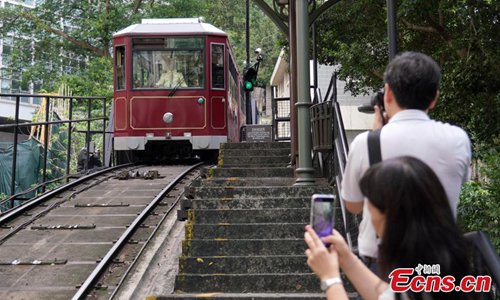HK residents slam violence against extradition bill
Passing the bill will weaken US influence in Hong Kong

A view of Hong Kong's Peak Tram, one of the world's oldest and most famous funicular railways, April 22, 2019. A project to upgrade the tram will involve a significant investment of HK$684 million, replacing the current tram cars, which have a capacity of 120 passengers, with new 210-passenger tram cars. The first suspension of the Peak Tram service will begin on April 23 and last approximately two to three months. Photo: China News Service
Violent activities continued in the Hong Kong Special Administrative Region (HKSAR) and have caused the city's Legislative Council to postpone a meeting to scrutinize the extradition bill that could allow the Chinese mainland to extradite criminals from Hong Kong.
A South China Morning Post report on Wednesday said many masked violent activists "armed with umbrellas and goggles are occupying all roads leading to Hong Kong's legislature as the government was forced to delay debate on the extradition bill."
These violent activists are mostly young people who had camped there overnight. They built metal barricades and walls of loose bricks in a face-off with riot police bearing shields and batons. Police used pepper spray on the crowds earlier, the Hong Kong-based newspaper said.
Hung Wai-man, a deputy of the HKSAR to the National People's Congress, told the Global Times that although the extradition bill is contentious, both sides of the bill strongly oppose violence.
"Those violent activists are a group of extreme and radical people who do not represent the mainstream of the city at all," Hung said.
Hung said local citizens believe the police is capable of controlling the situation using legal measures, and he suggests that the police should take more effective and direct action to stop the violence in the city.
Chan Cheuk-hay, a Hong Kong member of the National Committee of the Chinese People's Political Consultative Conference, said that the lack of knowledge of both the bill and national security among the locals has allowed protesters to radicalize many people.
"This has made reasonable dialogue very difficult. Many people distort the extradition bill… in fact, the bill is necessary and can guarantee the rights and freedom of Hong Kong citizens, so if protesters know the details of the bill, I think most of them will change their minds," Chan said.
Presidents of 10 Hong Kong universities issued a joint statement urging the different groups to consult each other to solve the dispute on the extradition bill as the situation became more intense on Wednesday, Mingpao reported.
Many Hong Kong web users on Hong Kong news portal websites like mingpao.com and stheadline.com criticized those who oppose the extradition bill and the violence in recent days.
"The mainland cannot extradite criminals from Hong Kong? Is there anything that can be more ridiculous than this? We are in one country! Those criminals should oppose the bill, not ordinary people of the city," said one named Charles Choy on stheadline.com.
Chinese Foreign Ministry spokesperson Geng Shuang said at a routine press conference on Wednesday that the Chinese central government firmly supports the HKSAR to push forward the work of the legislation amendment on extradition, and any behavior that harms Hong Kong's prosperity and stability would be opposed by the mainstream public opinion of the city.
Geng also said China expressed strong dissatisfaction and resolute opposition to US figures for their irresponsible statements on the Hong Kong issue as this is a purely Chinese matter that no country or individual has the right to interfere in.
One reason why the US interrupts China's affairs in Hong Kong is that if the extradition bill is passed, Washington's inappropriate influence in the city will be weakened and proxy foreign forces in Hong Kong that created trouble and conflict between the citizens and government will be punished by law more effectively, Tian Feilong, an associate professor at Beihang University in Beijing and an expert on Hong Kong, told the Global Times on Wednesday.